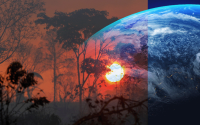NEW DELHI, Kyodo, Kyodo - So I don't know what is civilization and what is savagery. I feel that if you are killing a man and you are killing him yourself at least you are taking responsibility for that. But here technology has divested you from the morality of what you are doing completely. So how do you live with it? You don't want to know. In America, the media said, ''We don't want to report the civilian deaths in Afghanistan.'' But till today, 3,129 people died in the WTC attack. But in Afghanistan, it doesn't matter, we don't care. There are hundreds of thousands of refugees. God knows how many people died. One American was found fighting with the Taliban and in California the debate is about permissive parenting. (laughs) How did you allow him to go? (laughs aloud)...He has a name, that man, but no one else does. We don't know what is happening to those al-Qaida prisoners in Cuba. These are also the truth. There's also very much beauty in the world which one would call civilization. There's beauty in the world of the Adivasi (tribal community) on the Narmada River, who are not thought of as civilized but may be among the most civilized, sophisticated people. There is also beauty in modernity. There's also beauty in the music world, in the world of literature... -- You are always trying to stand up for the poor. But you also belong to a minority community in India. Has your religion come in the way of your activism? No, because Syrian Christians are an elite community in Kerala. I can't say that personally my mother is Syrian Christian and my father is from Bengal. My parents were divorced, so I didn't really belong to any community. -- How about being a woman? Nice...I feel great! (laughs) -- As a woman, have you had problems in your work? I think in India, it is very complicated. The other day, I was just trying to think of the most spectacular people that I know in India and they are all women. I don't even talk about this. There is a whole level at which criticisms happen because of the fact that one is a woman...I can deal with it. It's not difficult. That's no extra burden that I carry. I think today it's time for us, time for a woman to just take over in a beautiful sense. So it is all the women fighting in the Narmada Valley who the police is most scared of. They are most scared of us. The fact is that today, even though women are going through most terrible times in India, there are also women who are just flying, the freest people in the world. Some Indian women that I have met are absolutely the freest. Somehow they are managing to link modernity and the best things of tradition and the best things of modernity making that choice. -- What does religion mean to you? I think that probably (it's) the journey towards justice Everything that I'm involved with. My work, my writing, my thinking, my aesthetics...everything (that) is very precious and whatever is precious is religion to me. I am not religious in the sense that I am not a Hindu or a Muslim or a Christian or a Buddhist. But at the same time, I think this involvement in the debate between the (powerful) and the powerless is emerging as a kind of religion. I am trying to understand that, knowing that it's never a fight that you can win. The world is never going to be a just place. But it will be terribly sad, the day you will stop wanting it to be that, the day you will stop pushing it towards that. -- What do the state or government or nation mean to you? Nothing...I mean, no I don't think like that. I don't have a flag. I think in civilizations, not in countries... -- You don't need that kind of thing? Even if I need it, I don't want it. That's why some of us keep saying that, they tell us that we are anti-globalization. Actually, we are the ones who believe in globalization. We are the ones who say we don't want walls, we don't want bombs, we don't want countries, we don't want borders. They want globalization only for money. To move money around the world. Whereas we want it for ideas and for people and not for money. -- But suppose you were president of the United States. It can't be possible...I cannot be the president of the United States. Meaning that my whole issue is that as a writer, I stand away from the state. As a writer, I form part of the people. I will never cross that line because politics of opposition is what I believe in...politics of permanent opposition, continuous opposition and challenging power.... It's not just America. I am just saying whoever has that power -- whether it is capitalists, communists, socialists or Islamists or Christians -- it always needs to be opposed because that's how civil societies can always be made powerful...Power must always be challenged and there are some people who are comfortable with power and there are some people who are adversaries of power. -- But in society, politics is a must. There must be a leader. But that leader must always be challenged always. So I will never be the leader, I will be the arguer. I will be the person saying, ''What about this? What about that?'' -- You can't be distanced from those kind of politics? You don't have to think like that. There are enough people who are thinking like that. There are enough people who want power...you need that tension in society. And the more balanced it is, the more just your society will be. There can never be a government which is just without a proper opposition. So there are enough people thinking about the government, but there are not enough people thinking about the opposition. -- Does it sadden or frustrate you that some of the causes you fight for really have no solution, whether it is the Narmada dam or something else? The end result is not what you're expecting. There can never be an end result. Meaning if tomorrow they said ''We won't build the dam,'' that doesn't mean all the problems will be solved. I am talking about a continuous journey. So I would rather be on this side and lose than be on that side and win, (the side) I don't believe in. -- Can you understand people's anger or violence? Personally I can never condone violence...But approving something is very different from understanding something...Unless you pay attention to nonviolence, then how can you criticize violence? Because what do you say to people who for 15 years (have been) nonviolent, and they are being drowned and being pushed out and they don't care...I am not going to tell them that it doesn't matter, I don't know...That is not a decision that I can take on someone else's behalf. If my house was being drowned and my family was being removed and I had to beg on the streets then I would decide what I want to do. But someone else can't tell me, ''You do this, you do that.'' I wouldn't do that. -- Since you're so close to the anti-dam movement, how would you feel if they started using violence in their cause tomorrow? I would feel very, very sad. But the fact is that there are two kinds of nonviolence. There is nonviolence as a morality, which is for people like me who are not directly being submerged or deprived. Then there is nonviolence as strategy to fight. The problem is that for the very poor, the reason it doesn't often make sense to be violent is because the state reacts with 50 times more violence. I mean Bush will pulverize Afghanistan. You have to look at it as a strategy. What is the best way to resist for them? You have to look at it that way because they don't have weapons. They don't have money. They don't have anything. -- So sometimes that kind of violence is OK? It's only when people are desperate, the only weapon that they have is their own lives. That's what makes the suicide bombers such a frightening thing in today's world. It's come to a stage where people are willing to just die. And once one crosses that line, then the rules change. That's what I am saying. But just now in Narmada Valley, people are fighting for their lives, for the rivers, for the fish, for the environment, for the insects, for the birds. So they are not fighting to kill anybody. They are fighting to live, which is why it can't be violent. I don't know what will happen. -- Why did you name your recent essay ''Power Politics''? It is power as in electricity, as in Enron. President Bush had a lot to do with Enron. But (there) was also pun intended, because all that has got something to do with power. -- Is it addressed to politicians? My book is not addressed to politicians. It's about the writer trying to understand about issues, which is normally very difficult for people to understand. Common people don't understand globalization or what happens when they build dams. They think globalization means you can buy foreign shampoos in the shops, so I am trying to explain (it)...to ordinary people. -- Are you optimistic about the future? I think that it's a very terrifying time, but what happened is that Sept. 11, for all its tragedy, drew the line very clearly. For the first time ever, the history of American foreign policy has come out and is being discussed. People are beginning to understand what's going on. Sometimes they need a terrible thing to happen to do that. So I think that's happening. I think the whole process of corporate globalization is being challenged by people who are just being excluded from this process. So I think that it's a very risky time. It could be a very bad time. Depending on how you look at it. But it's a very dangerous time. -- In such a world, how should we react as individuals? Well, I don't know. I am reacting in the things that I write. I think the first thing is to understand and to make up your mind... -- Do you believe that the world could be a better place to live in after all this? Is there a movement in the right direction? I think so. Now even inside America, now people are slowly beginning to question. -- Do you think that kind of voice will be heard in the U.S.? It will have to because I think the U.S. has fallen off its pedestal. That's why it is rattling its weapons now, because post-Sept. 11, the U.S media...was a joke for the rest of the world. Suddenly this great free country showed its real colors. So now, to get back the shine isn't easy. Biographical note: Arundathi Roy was born in Kerala, southern India, in November 1961 and grew up in a small village in the tropical state. Her Christian mother, a renowned educator and activist there, divorced her Bengali Brahmin father and raised her two children.. At 16, Roy left home to study architecture in Delhi, where she met her first husband. They married and she went to the coastal state of Goa, a haven for hippies, and sold fruit juice and lived on the beach. She later left her husband and returned to Delhi, where she sold her wedding ring for food. After a brief stint as an aerobics instructor, she took to screenwriting and acted in two movies, during which she met her second husband, a filmmaker. ''The God of Small Things'' followed. With its lyrical style and unusual syntax, the work sold over 6 million copies and was translated into 40 languages including Japanese. Roy has been continuously involved in verbal spats with other intellectuals through the media. Some have even called her writing misappropriations of the works of others. But many admit she is passionate about her causes and is willing to undergo any hardships for them. Her anti-dam activism recently landed her in jail for a day for contempt of court. She has vowed to continue her struggle. (END)
http://home.kyodo.co.jp/all/printer_friendly.jsp?an=20020420007






